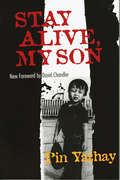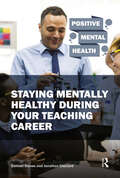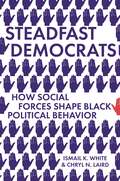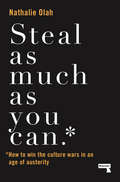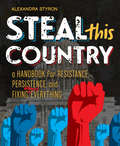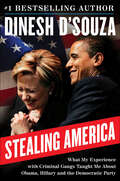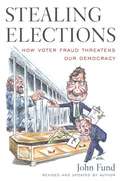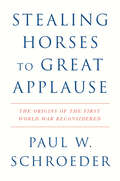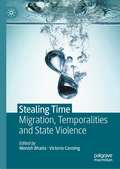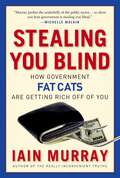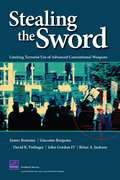- Table View
- List View
Stay Alive, My Son
by John Man Pin YathayOn April 17, 1975, the Khmer Rouge entered Phnom Penh to open a new and appalling chapter in the story of the twentieth century. On that day, Pin Yathay was a qualified engineer in the Ministry of Public Works. Successful and highly educated, he had been critical of the corrupt Lon Nol regime and hoped that the Khmer Rouge would be the patriotic saviors of Cambodia. In Stay Alive, My Son, Pin Yathay provides an unforgettable testament of the horror that ensued and a gripping account of personal courage, sacrifice and survival. Documenting the 27 months from the arrival of the Khmer Rouge in Phnom Penh to his escape into Thailand, Pin Yathay is a powerful and haunting memoir of Cambodias killing fields. With seventeen members of his family, Pin Yathay were evacuated by the Khmer Rouge from Phnom Penh, taking with them whatever they might need for the three days before they would be allowed to return to their home. Instead, they were moved on from camp to camp, their possessions confiscated or abandoned. As days became weeks and weeks became months, they became the "New People," displaced urban dwellers compelled to live and work as peasants, their days were filled with forced manual labor and their survival dependent on ever more meager communal rations. The body count mounted, first as malnutrition bred rampant disease and then as the Khmer Rouge singled out the dissidents for sudden death in the darkness. Eventually, Pin Yathays family was reduced to just himself, his wife, and their one remaining son, Nawath. Wracked with pain and disease, robbed of all they had owned, living on the very edge of dying, they faced a future of escalating horror. With Nawath too ill to travel, Pin Yathay and his wife, Any, had to make the heart-breaking decision whether to leave him to the care of a Cambodian hospital in order to make a desperate break for freedom. "Stay alive, my son," he tells Nawath before embarking on a nightmarish escape to the Thai border. First published in 1987, the Cornell edition of Stay Alive, My Son includes an updated preface and epilogue by Pin Yathay and a new foreword by David Chandler, a world-renowned historian of Cambodia, who attests to the continuing value and urgency of Pin Yathays message.
Stay Dead
by April HenryNew York Times bestselling author April Henry delivers a thrilling murder mystery featuring a teen with an assassin on her trail fighting to uncover the truth behind a government cover up, perfect for fans of Karen McManus."A page-turning cat-and-mouse survival story." —Kirkus ReviewsSometimes, the only way to live is to make sure the world thinks you&’re dead . . . In the aftermath of a car accident that claimed the life of her senator father, sixteen-year-old Milan finds herself adrift, expelled from her third boarding school. Milan&’s mother, who has assumed the senate seat, diverts her private plane to pick up her daughter. But on their way home, a bomb rips off a wing and the plane crashes in the mountains. In her final moments, Milan&’s mother entrusts her with a key. She reveals it will unlock the evidence that so many people have already died for—including Milan&’s father. The only way Milan can survive, her mom tells her, is to let everyone believe she died with the other passengers. Milan is forced to navigate a perilous descent in freezing conditions while outwitting everything from a drone to wild animals. With relentless assassins on her trail, she must untangle the web of deceit and save herself and countless others. Will she piece together the truth in time?"Milan is in a race against time and terror to get to her parents&’ one trusted friend before she ends up dead, too… readers will be intrigued and thrilled to see how it all turns out." —Booklist"The cat-and-mouse between Milan and Lenny adds a thick layer of tension, especially as Lenny closes in on her target… things come together nicely as the climax looms. Perfect for fans of Mindy McGinnis." —School Library Journal
Stay Home: Housing and Home in the UK during the COVID-19 Pandemic
by Becky TunstallThe UK housing system has been described as being in ‘crisis’, but suddenly in 2020 homes were on the COVID-19 frontline, used for shielding, isolating and care. Most were used by more people, for more hours, for more activities. Many households were cut off from normal services and contacts, and many lost the means to pay for their homes. Millions of infections occurred at home, and inequalities in household type, housing space, cost and tenure contributed to the unequal impact of the pandemic. This book brings together a wealth of data, individual testimony and analysis, in one convenient resource for students, scholars and practitioners.
Stay the Hand of Vengeance: The Politics of War Crimes Tribunals (Princeton Studies in International History and Politics #93)
by Gary Jonathan BassInternational justice has become a crucial part of the ongoing political debates about the future of shattered societies like Bosnia, Kosovo, Rwanda, Cambodia, and Chile. Why do our governments sometimes display such striking idealism in the face of war crimes and atrocities abroad, and at other times cynically abandon the pursuit of international justice altogether? Why today does justice seem so slow to come for war crimes victims in the Balkans? In this book, Gary Bass offers an unprecedented look at the politics behind international war crimes tribunals, combining analysis with investigative reporting and a broad historical perspective. The Nuremberg trials powerfully demonstrated how effective war crimes tribunals can be. But there have been many other important tribunals that have not been as successful, and which have been largely left out of today's debates about international justice. This timely book brings them in, using primary documents to examine the aftermath of the Napoleonic Wars, World War I, the Armenian genocide, World War II, and the recent wars in the former Yugoslavia. Bass explains that bringing war criminals to justice can be a military ordeal, a source of endless legal frustration, as well as a diplomatic nightmare. The book takes readers behind the scenes to see vividly how leaders like David Lloyd George, Winston Churchill, Franklin Roosevelt, and Bill Clinton have wrestled with these agonizing moral dilemmas. The book asks how law and international politics interact, and how power can be made to serve the cause of justice. Bass brings new archival research to bear on such events as the prosecution of the Armenian genocide, presenting surprising episodes that add to the historical record. His sections on the former Yugoslavia tell--with important new discoveries--the secret story of the politicking behind the prosecution of war crimes in Bosnia, drawing on interviews with senior White House officials, key diplomats, and chief prosecutors at the war crimes tribunal for the former Yugoslavia. Bass concludes that despite the obstacles, legalistic justice for war criminals is nonetheless worth pursuing. His arguments will interest anyone concerned about human rights and the pursuit of idealism in international politics.
Staying Alive
by Vandana ShivaInspired by women's struggles for the protection of nature as a condition for human survival, award-winning environmentalist Vandana Shiva shows how ecological destruction and the marginalization of women are not inevitable, economically or scientifically. She argues that "maldevelopment"--the violation of the integrity of organic, interconnected, and interdependent systems that sets in motion a process of exploitation, inequality, and injustice--is dragging the world down a path of self-destruction, threatening survival itself. Shiva articulates how rural Indian women experience and perceive ecological destruction and its causes, and how they have conceived and initiated processes to arrest the destruction of nature and begin its regeneration. Focusing on science and development as patriarchal projects, Staying Alive is a powerfully relevant book that positions women not solely as survivors of the crisis, but as the source of crucial insights and visions to guide our struggle.From the Trade Paperback edition.
Staying Mentally Healthy During Your Teaching Career (Positive Mental Health)
by Jonathan Glazzard Samuel StonesThe mental health of teachers in school is just as important as the well-being of the pupils they support. Recent research reveals some alarming statistics, including that 74% of teachers are unable to relax and have a poor work-life balance. This book examines a range of relevant issues including workload, managing behaviour, developing resilience and managing professional relationships in order to address some of these concerns and provide comprehensive guidance and workable, evidence-informed strategies to support all those teaching in schools and colleges.
Staying Together: The G8 Summit Confronts the 21st Century (The\g8 And Global Governance Ser.)
by Nicholas BayneFollowing on from Hanging In There, this comprehensive volume empirically covers the summits from the UK meeting in Birmingham in 1998 to the UK meeting in 2005. In essence, this study reviews a full G8 cycle. The analytical framework rests on three general summit objectives: political leadership, reconciling international/domestic and collective management, and six subject-specific performance indicators: leadership, effectiveness, solidarity, durability, acceptability, consistency. Including a detailed look at summits pre-Birmingham, it reviews developments from 1998 by examining each summit from the subsequent summit performances, such as financial issues and debt, trade issues and development, to the most recent discussion on Africa, terrorism and weapons of mass destruction. Moreover, it covers the development of the G8 apparatus, the impact of Russia's membership and links with non-G8 governments and non-state actors. It concludes with an assessment as to whether the G8 achieves its three general summit objectives.
Staying Tuned
by Daniel Schorr"In May 1999 Kevin Klose, president of National Public Radio, invited me to a meeting of the NPR board and surprised me with a bronze plaque, emblazoned 'Lifetime Achievement Award.' I responded that, ever the copy-reader, I wished to amend the wording to, 'Lifetime Achievement So Far...'" Thus Daniel Schorr, octogenarian, newsman, and last of the legendary Edward R. Murrow news team still active in journalism, let it be known that after six decades of reporting, digging out information, and finding himself the controversial subject of some stories, he is still fully engaged in the world-watching that has made him one of America's most honored journalists. He is both a national and an international eyewitness. At home, he has covered and analyzed major events from the McCarthy anti-Communist hearings of the 1950s to the Clinton impeachment hearings of the 1990s. As CBS's chief Watergate correspondent, he won three Emmys® for his coverage of that scandal -- during which he found himself on Nixon's "enemies" list. Abroad, he opened the CBS bureau in Moscow in 1955, arranged an unprecedented television interview with Soviet boss Nikita Khrushchev, and was on hand for every major European event from the founding of NATO to the building of the Berlin Wall. At home and overseas his no-holds-barred approach to covering the news landed him in trouble with the authorities. He may be one of the only journalists investigated by both the KGB and the FBI. In the 1970s, Schorr's revelations of CIA and FBI misdeeds brought him into a confrontation with Congress. Refusing to name his sources before the House Ethics Committee, he was threatened with jail for contempt -- a threat that was not carried out. He also came into confrontation with CBS, his employer, leading to his resignation. A multimedia journalist, Schorr has worked in newspapers, radio, and television. Today, he runs around less, but is still probing. In Staying Tuned, he reflects on the role of the media in our society, expressing concerns about television's assault on reality. As to how life has changed for him, Schorr says: "In my days as an investigative reporter, my motto was, 'Find out what they're hiding and tell those who need to know.' In my more sedentary days, the motto changed to, 'The people know a lot. Tell them what to make of it.'"
Staying in Bounds: Straight Talk on Boundaries for Effective Ministry
by Eileen SchmitzBoundaries are healthy and necessary parts of life and ministry. Staying in Bounds provides straight-talk guidance to ministers and other leaders of churches and faith-based organizations on the what, why, and how of relational boundaries. Provides guidance on identifying, implementing, and enforcing healthy boundaries, with a special focus on ministry settings. The author develops the concept of boundaries from psychological and theological perspectives, discusses the benefits of boundaries, and then explains the importance of healthy boundaries in the church.
Steadfast Democrats: How Social Forces Shape Black Political Behavior (Princeton Studies in Political Behavior #19)
by Ismail K. White Chryl N. LairdA groundbreaking look at how group expectations unify black Americans in their support of the Democratic partyBlack Americans are by far the most unified racial group in American electoral politics, with 80 to 90 percent identifying as Democrats—a surprising figure given that nearly a third now also identify as ideologically conservative, up from less than 10 percent in the 1970s. Why has ideological change failed to push more black Americans into the Republican Party? Steadfast Democrats answers this question with a pathbreaking new theory that foregrounds the specificity of the black American experience and illuminates social pressure as the key element of black Americans’ unwavering support for the Democratic Party.Ismail White and Chryl Laird argue that the roots of black political unity were established through the adversities of slavery and segregation, when black Americans forged uniquely strong social bonds for survival and resistance. White and Laird explain how these tight communities have continued to produce and enforce political norms—including Democratic Party identification in the post–Civil Rights era. The social experience of race for black Americans is thus fundamental to their political choices. Black voters are uniquely influenced by the social expectations of other black Americans to prioritize the group’s ongoing struggle for freedom and equality. When navigating the choice of supporting a political party, this social expectation translates into affiliation with the Democratic Party. Through fresh analysis of survey data and original experiments, White and Laird explore where and how black political norms are enforced, what this means for the future of black politics, and how this framework can be used to understand the electoral behavior of other communities.An innovative explanation for why black Americans continue in political lockstep, Steadfast Democrats sheds light on the motivations consolidating an influential portion of the American electoral population.
Steal As Much As You Can: How to Win the Culture Wars in an Age of Austerity
by Nathalie OlahTo put it plainly then: the vast majority of people tasked with creating our media simply lack the sensibilities that have always driven artistic innovation.The 2010s have been a double-edged decade. Socioeconomic factors have led to the widespread and increased disenfranchisement of poorer people from the mainstream media and the institutions shaping it. This has coincided with a growing number of people from low income backgrounds also receiving better educations than ever before, and having the means at their disposal to both name and resent it. Steal as much as you can is the story of how this bright generation came to be, and what effective means are still at their disposal to challenge the establishment and ultimately win. By rejecting the established routines of achieving prosperity, and by stealing what you can from them on the way, this book offers hope to anyone who feels increasingly frustrated by our increasingly unequal society.
Steal This Book
by Abbie HoffmanA classic of counterculture literature and one of the most influential and controversial documents of the 20th century, this is an instruction manual for young activists and radical social change.
Steal This Book
by Abbie HoffmanStill Notorious, Radical, and Revolutionary 50 Years Later.A survival guide from one of the greatest creative organizers of the 20th century—now with a new foreword by co-conspirator, Lisa Fithian. Throughout the 1960's and 70's, Abbie Hoffman criss-crossed the country, ferreting out alternative ways of getting by in America—some illegal and all radical. Causing scandals with its advice on how to Survive!, Fight!, and Liberate! in the &“prison that is Amerika,&” Steal This Book is a revolutionary's manual to running a guerilla movement, as well as getting free food, housing, transportation, medical care, and more. This anniversary edition gives a new generation an insider's view into the movements of the sixties and seventies. While many of the holes in the system that Abbie exposed have since been plugged, the spirit of revolution, the dedication to opposing injustice, and the passion of creative activism continue to inspire today.
Steal This Country: A Handbook for Resistance, Persistence, and Fixing Almost Everything
by Alexandra StyronA walk-the-walk, talk-the-talk, hands-on, say-it-loud handbook for activist kids who want to change the world!Inspired by Abbie Hoffman's radical classic, Steal This Book, author Alexandra Styron's stirring call for resistance and citizen activism will be clearly heard by young people who don't accept "it is what it is," who want to make sure everybody gets an equal piece of the American pie, and who know that the future of the planet is now. Styron's irreverent and informative primer on how to make a difference is organized into three sections: The Why, The What, and The How. The book opens with a personal essay and a historic look at civil disobedience and teenage activism in America. That's followed by a deep dive into several key issues: climate change, racial justice, women's rights, LGBTQIA rights, immigration, religious understanding, and intersectionality. Each chapter is introduced by an original full page comic and includes a summary of key questions, interviews with movers and shakers--from celebrities to youth activists--and spotlights on progressive organizations. The book's final section is packed with how-to advice on ways to engage, from group activities such as organizing, marching, rallying, and petitioning to individual actions like voting with your wallet, volunteering, talking with relatives with different viewpoints, and using social activism to get out a progressive message. This is a perfect book for older middle-schoolers and teens who care about the planet, the people with whom they share it, and the future for us all.
Steal This University: The Rise of the Corporate University and the Academic Labor Movement
by Benjamin Johnson Patrick Kavanagh Kevin MattsonSteal This University explores the paradox of academic labor. Universities do not exist to generate a profit from capital investment, yet contemporary universities are increasingly using corporations as their model for internal organization. While the media, politicians, business leaders and the general public all seem to share a remarkable consensus that higher education is indispensable to the future of nations and individuals alike, within academia bitter conflicts brew over the shape of tomorrow's universities. Contributors to the volume range from the star academic to the disgruntled adjunct and each bring a unique perspective to the discussion on the academy's over-reliance on adjuncts and teaching assistants, the debate over tenure and to the valiant efforts to organize unions and win rights.
Stealing America: What My Experience with Criminal Gangs Taught Me about Obama, Hillary, and the Democratic Party
by Dinesh D'Souza#1 New York Times–bestselling Author: Why Hillary, Obama, and the entire Democratic Party are no better than a gang of thieves.In the fall of 2014, outspoken author and filmmaker Dinesh D’Souza found himself hauled into federal court for improperly donating money to an old friend’s Senate campaign. D’Souza pleaded guilty and was sentenced to eight months in a state-run confinement center. There he lived among hardened criminals—drug dealers, thieves, gangbangers, rapists, and murderers. Now the bestselling author explains how this experience not only changed his life, but fundamentally transformed his view of his adopted country.Previously, D’Souza had seen America through the eyes of a grateful immigrant who became successful by applying and defending conservative principles. Again and again, D’Souza made the case that America is an exceptional nation, fundamentally fair and just. In book after book, he argued against liberalism as though it were a genuine movement of ideas capable of being engaged and refuted.But his prolonged exposure to the criminal underclass provided an eye-opening education in American realities. In the view of hardened criminals, D’Souza learned, America is anything but fair and just. Instead, it is a jungle in which various armed gangs face off against one another, with the biggest and most powerful gangs inhabiting the federal government. As for American liberalism, it is not a movement of ideas at all but a series of scams and cons aimed at nothing less than stealing the entire wealth of the nation, built up over more than two centuries: the total value of the homes, the lifelong savings of the people, the assets of every industry, and all the funds allocated to health and education and every other service, both public and private. “The thieves I am speaking about want all of it.”And who are the leading figures in this historically ambitious scam that has turned the federal government into a vast and unprecedented shakedown scheme? Why, none other than Barack Obama and Hillary Clinton. This pair of smooth-talking con artists, trained in the methods of radical activist Saul Alinsky, have taken his crude but effective political shakedown techniques to a level even he never dreamed of. Stealing America is an urgent wakeup call for all Americans who want to prevent this theft from being completed.
Stealing Elections
by John FundJohn Fund explores the real divide the country faces with the looming election. Through wary thoughts on voting integrity, he shows how eletions can be decided by the votes of dead people, illegal felon voters, and absentee voters that simply don't exist. If nothing is done to address the growing cynicism about vote counting, rest assured that another close presidential election that descends into bitter partisan wrangling is just around the corner.
Stealing God: The Road to Redemption Series (The\road To Redemption Ser. #2)
by James GreenCorrupt copper and bad Catholic Jimmy Costello is back, and he's studying to be a priest in Rome.But his old life refuses to stay buried . . .When a visiting archbishop dies in suspicious circumstances, the Kilburn hard man is asked to drop his religious studies and help local police investigate. Together with his partner Inspector Ricci, Jimmy follows a twisting trail of evidence from the streets of the Holy City to Glasgow and back, where they uncover a sinister plot more evil than they had ever imagined.
Stealing Home: Los Angeles, the Dodgers, and the Lives Caught in Between
by Eric NusbaumA story about baseball, family, the American Dream, and the fight to turn Los Angeles into a big league city.Dodger Stadium is an American icon. But the story of how it came to be goes far beyond baseball. The hills that cradle the stadium were once home to three vibrant Mexican American communities. In the early 1950s, those communities were condemned to make way for a utopian public housing project. Then, in a remarkable turn, public housing in the city was defeated amidst a Red Scare conspiracy.Instead of getting their homes back, the remaining residents saw the city sell their land to Walter O'Malley, the owner of the Brooklyn Dodgers. Now LA would be getting a different sort of utopian fantasy -- a glittering, ultra-modern stadium.But before Dodger Stadium could be built, the city would have to face down the neighborhood's families -- including one, the Aréchigas, who refused to yield their home. The ensuing confrontation captivated the nation - and the divisive outcome still echoes through Los Angeles today.
Stealing Horses to Great Applause: The Origins of the First World War Reconsidered
by Paul W. SchroederStand-out theoretical and empirical explanation of the origins of the First World War by one of the great historians of international diplomacyStealing Horses to Great Applause presents arguably the finest considerations yet of the origins of the First World War. Breaking with accounts which focus on the actions of a single state or the final countdown to hostilities, Paul W. Schroeder describes the systemic crisis engulfing the Great Powers.They were more interested in colonial plunder overseas (stealing horses to great applause, in the old Spanish adage) than the traditional statecraft of European peace-making. Preserving the balance of power required preserving all the essential actors in it, including a tottering Austria-Hungary. This the British in particular failed to recognise. The Central Powers may have started the War but that does not mean they in any real sense caused it. In the end Schroeder recalls the verdict of Shakespeare's Romeo and Juliet: All are punished.Stealing Horses to Great Applause includes appraisals of Niall Ferguson and A. J. P. Taylor, and an extensive unpublished final paper rethinking the First World War as "the last 18th-century war."With an introduction by Perry Anderson.
Stealing Lincoln's Body
by Thomas J. CraughwellOn the night of the presidential election in 1876, a gang of counterfeiters out of Chicago attempted to steal the entombed embalmed body of Abraham Lincoln and hold it for ransom. The custodian of the tomb was so shaken by the incident that he willingly dedicated the rest of his life to protecting the president's corpse. In a lively and dramatic narrative, Thomas J. Craughwell returns to this bizarre, and largely forgotten, event with the first book to place the grave robbery in historical context. He takes us through the planning and execution of the crime and the outcome of the investigation. He describes the reactions of Mary Todd Lincoln and Robert Todd Lincoln to the theft―and the peculiar silence of a nation. He follows the unlikely tale of what happened to Lincoln's remains after the attempted robbery, and details the plan devised by the Lincoln Guard of Honor to prevent a similar abominable recurrence. Along the way, Craughwell offers entertaining sidelights on the rise of counterfeiting in America and the establishment of the Secret Service to combat it; the prevalence of grave robberies; the art of nineteenth-century embalming; and the emergence among Irish immigrants of an ambitious middle class―and a criminal underclass. This rousing story of hapless con men, intrepid federal agents, and ordinary Springfield citizens who honored their native son by keeping a valuable, burdensome secret for decades offers a riveting glimpse into late-nineteenth-century America, and underscores that truth really is sometimes stranger than fiction.
Stealing Time: Migration, Temporalities and State Violence
by Monish Bhatia Victoria CanningThis book draws together empirical contributions which focus on conceptualising the lived realities of time and temporality in migrant lives and journeys. This book uncovers the ways in which human existence is often overshadowed by legislative interpretations of legal and illegalised. It unearths the consequences of uncertainty and unknowing for people whose futures often lay in the hands of states, smugglers, traffickers and employers that pay little attention to the significance of individuals’ time and thus, by default, their very human existence. Overall, the collection draws perspectives from several disciplines and locations to advance knowledge on how temporal exclusion relates to social and personal processes of exclusion. It begins by conceptualising what we understand by ‘time’ and looks at how temporality and lived realities of time combine for people during and after processes of migration. As the book develops, focus is trained on temporality and survival during encampment, border transgression, everyday borders and hostility, detention, deportation and the temporal impacts of border deaths. This book both conceptualises and realises the lived experiences of time with regard to those who are afforded minimal autonomy over their own time: people living in and between borders.
Stealing You Blind: How Government Fat Cats Are Getting Rich Off of You
by Iain MurraySince the Obama administration has taken office, government bureaucracy, government regulation and government spending have exploded. In his new book, Stealing You Blind, author Iain Murray reveals where all that money is going....and just how much of that money goes into the pockets of incompetent government workers, lazy union bosses, inept state educators, and bureaucratic officials. "The administration is swindling us", says Murray. "They promise to use tax payer dollars to give us better healthcare or a stronger financial system, but then use that money to line coffers, create more bureaucratic agencies, and fatten their wallets." Shocking and controversial, Stealing You Blind reveals how Obama and the Left are intent on on feeding government fat cats--and what you can do about it.
Stealing Your Vote: The Inside Story of the 2020 Election and What It Means for 2024
by Christina BobbHow Election Fraud Is Rampant, and How to Stop It before It Kills America The mainstream media has labeled it "The Big Lie," but the facts on the ground tell a very different story. While politicians on both sides of the aisle scramble to stifle all investigations into election fraud, and the mainstream media pumps out "nothing to see here" stories, investigative reporter Christina Bobb reveals the ugly truth: the 2020 election was riddled with lying, cheating, stealing, and vote dumping which disenfranchised millions of Americans and probably swayed the outcome of the election. As usual, the cover-up was even worse than the crime, as politicians, media and activists launched an all-out assault on facts and evidence, doing everything in their power to bury the truth and slander anyone who dared ask the inconvenient questions. Stealing Your Vote tells the story of corruption within the Democratic Party—but also reveals the cowardice throughout the Republican Party, as fat and happy politicians from both parties desperately worked to protect the status quo. Bobb also tells the story of a handful of brave patriots who tried, and continue trying, to find out just what happened in 2020. As we look forward to 2024, we face an unprecedented crisis: millions of Americans have now lost faith in the integrity of our elections. The country has become ever-more polarized, pitting those who believe the election was stolen versus those who are determined to cancel both the investigations and the doubters. But election integrity should not be a partisan issue. Fair and honest elections are the bedrock of our republic—while tainted elections are the hallmark of tyranny. If we fail to regain election integrity and the trust of the American people, all of us, Democrat and Republican, liberal and conservative, are doomed to a dark future. Christina Bobb's Stealing Your Vote is the first and only investigative report into what truly happened in the 2020 elections and the cover-up that followed, and what we must do now as our next presidential election approaches.
Stealing the Sword: Limiting Terrorist Use of Advanced Conventional Weapons
by David R. Frelinger Brian A. Jackson James Bonomo Giacomo BergamoExamines how terrorists make technology choices and how the United States can discourage terrorists' use of advanced conventional weapons. Concludes that the United States should urgently start discussions with key producer nations and also decide on an architecture needed to impose technical controls on new mortar systems that should enter development soon.
